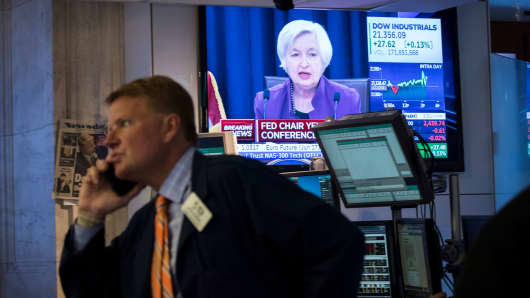I may be dating myself a bit, but I keep thinking of former Federal Reserve Chair Alan Greenspan and the once famous briefcase indicator.
On his way to FOMC meetings, if his briefcase was full, it meant Greenspan was set to raise short-term rates. Vice versa if it was thin. It was, of course, meant to be taken as a humorous indicator of any change to the direction of Fed policy, but it highlights what I will miss most about current Federal Reserve Chair Janet Yellen if President Donald Trump replaces her.
My Wall Street career started when Alan Greenspan was into his position of Fed Chair for only about three years. He was famous for talking in circles, sometimes seemingly in utter gibberish, and after he retired, he even admitted to doing so to throw Wall Street off his scent. To Greenspan, his power lay in his ability to surprise investors. He kept us on our toes; you never really knew his next action, and his surprises caused market volatility. Wall Street economists had to get down and dirty with economic and market data to try and glean Greenspan's next move. It was hard work, and it opened investors to having their expectations dashed.
Yellen, on the other hand, has been clear about her expectations for the direction of Fed policy, telegraphing to market participants what her next move would most likely be. This openness started with her predecessor, Ben Bernanke, but Yellen took it to a higher level of forthrightness. She is anything but unpredictable. This is a key reason behind the low stock market volatility. Not to say it is the only reason, but she removed one very big potential surprise from investors' radar.
"The bottom line for me is going to be the same, no matter who Trump picks: Investors aren't going to be gellin' like they were with Yellen."
With the horse race nearing the finish line to name her replacement, I think investors are going to miss her. Yellen has already set the course for such a gentle glide of QE drawdown from the Fed's massive balance sheet, that in the beginning it'll hardly be noticeable. Also, according to the CME's Fed Watch Tool, there is nearly a 90 percent chance the Fed will raise rates at its FOMC meeting in December. It's been accepted by investors that once that percentage odds rises to 70 percent, she is giving the green light to raise rates.
It was hard for Wall Street to accept her "data dependent" mantra when she discussed the economy's growth and inflation metrics. Granted, the Street has a very strong desire to reduce uncertainty as much as possible. But Yellen couldn't have been more honest with everyone. Simply put, if she didn't know her next move, she waited for the situation to develop so she could gather more data.
More from Smart Investing:
Bitcoin too risky for "serious" investing, say advisors
Millennials lack confidence to invest: Bank executive
What investors should do before market gets gored
I know that most Wall Streeters view her simply as a dove, but I see her as a patient, open steward of the nation's interest-rate policy-setting authority. Plus, she is a very strong believer in an independent Federal Reserve, unencumbered by political influence, which in the age of Trump, makes her unlikely to be reappointed to the position.
At the finish line, potential nominees to be the next Federal Reserve chairman include Kevin Warsh and Jerome Powell. Powell is seen as more of a continuation to Yellen, but by no means an exact policymaking clone. When Warsh's name was first floated, interest rates quickly spiked because he has said in the past that the Fed should have started reducing its balance sheet and raise rates much sooner than Yellen actually did. More recently, Stanford University professor John Taylor has also moved up in the prediction markets, and Warsh now has fallen even behind Yellen. In fact, at a Capitol Hill lunch meeting on Tuesday, Trump asked for a Senate show of hands — a straw poll — for next Fed chair. Taylor won, which immediately shook the bond market.
But the bottom line for me is going to be the same, no matter who Trump picks: Investors aren't going to be gellin' like they were with Yellen. Both stock and bond investors are about to lose a major underpinning for the record-low volatility. The Warsh announcement was just an early warning.
— By Mitch Goldberg, president of investor advisory firm ClientFirst Strategy










